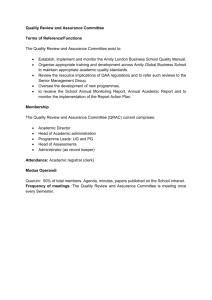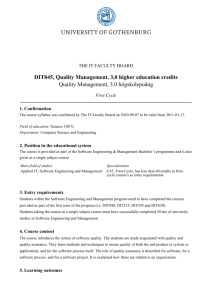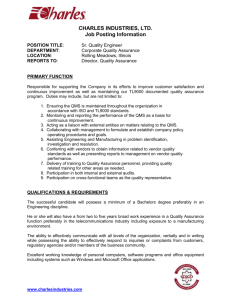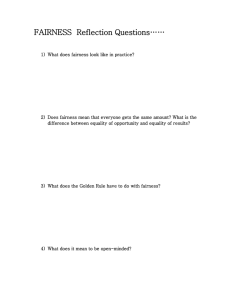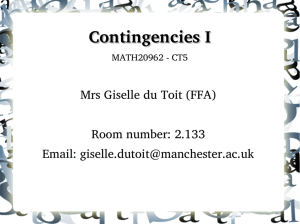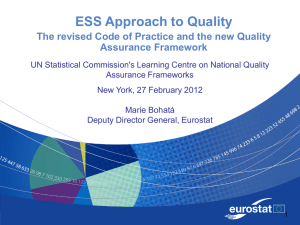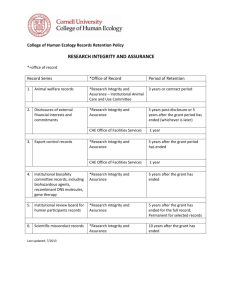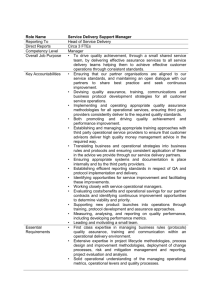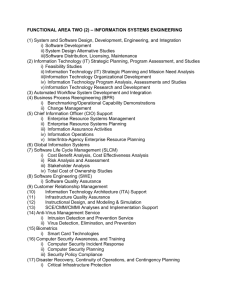Code of practice for the assurance of academic quality and
advertisement
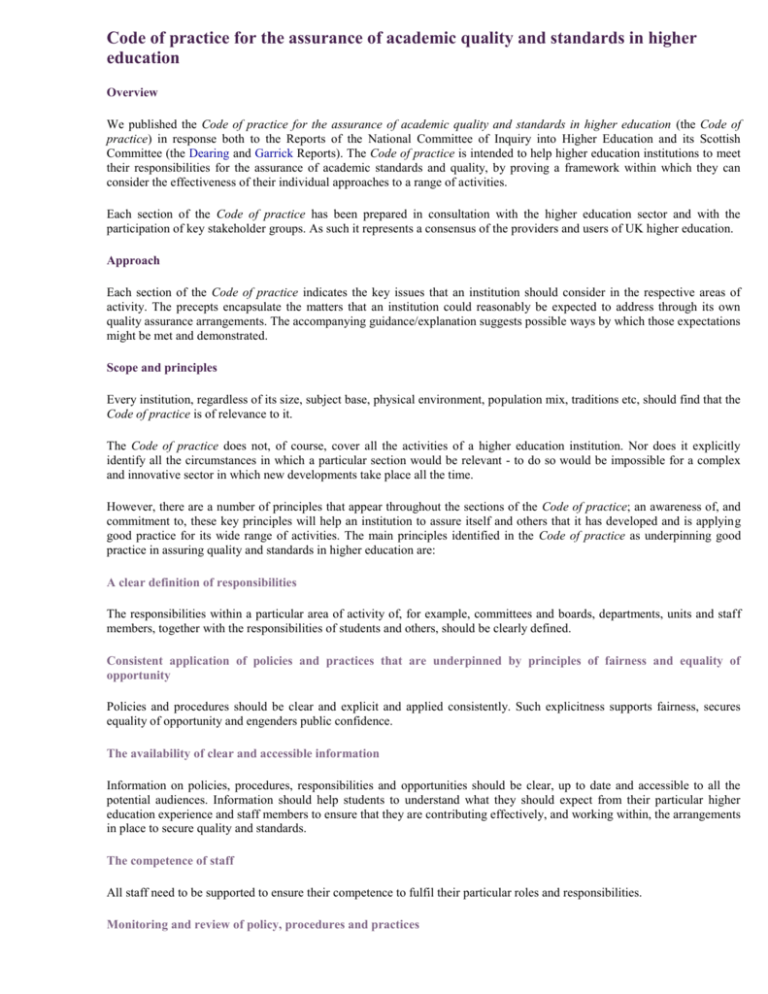
Code of practice for the assurance of academic quality and standards in higher education Overview We published the Code of practice for the assurance of academic quality and standards in higher education (the Code of practice) in response both to the Reports of the National Committee of Inquiry into Higher Education and its Scottish Committee (the Dearing and Garrick Reports). The Code of practice is intended to help higher education institutions to meet their responsibilities for the assurance of academic standards and quality, by proving a framework within which they can consider the effectiveness of their individual approaches to a range of activities. Each section of the Code of practice has been prepared in consultation with the higher education sector and with the participation of key stakeholder groups. As such it represents a consensus of the providers and users of UK higher education. Approach Each section of the Code of practice indicates the key issues that an institution should consider in the respective areas of activity. The precepts encapsulate the matters that an institution could reasonably be expected to address through its own quality assurance arrangements. The accompanying guidance/explanation suggests possible ways by which those expectations might be met and demonstrated. Scope and principles Every institution, regardless of its size, subject base, physical environment, population mix, traditions etc, should find that the Code of practice is of relevance to it. The Code of practice does not, of course, cover all the activities of a higher education institution. Nor does it explicitly identify all the circumstances in which a particular section would be relevant - to do so would be impossible for a complex and innovative sector in which new developments take place all the time. However, there are a number of principles that appear throughout the sections of the Code of practice; an awareness of, and commitment to, these key principles will help an institution to assure itself and others that it has developed and is applying good practice for its wide range of activities. The main principles identified in the Code of practice as underpinning good practice in assuring quality and standards in higher education are: A clear definition of responsibilities The responsibilities within a particular area of activity of, for example, committees and boards, departments, units and staff members, together with the responsibilities of students and others, should be clearly defined. Consistent application of policies and practices that are underpinned by principles of fairness and equality of opportunity Policies and procedures should be clear and explicit and applied consistently. Such explicitness supports fairness, secures equality of opportunity and engenders public confidence. The availability of clear and accessible information Information on policies, procedures, responsibilities and opportunities should be clear, up to date and accessible to all the potential audiences. Information should help students to understand what they should expect from their particular higher education experience and staff members to ensure that they are contributing effectively, and working within, the arrangements in place to secure quality and standards. The competence of staff All staff need to be supported to ensure their competence to fulfil their particular roles and responsibilities. Monitoring and review of policy, procedures and practices Policies, procedures and practices need to be monitored and reviewed from time to time to ensure their effectiveness and to identify and correct any consequences that might undermine the assurance of quality, standards, fairness or equality of opportunity. Use of the Code of practice in audit and review Institutions will not be asked about their adherence to the Code of practice on a precept by precept basis. They will be expected to explain in their self-evaluation documents how they have addressed the intentions of the precepts, including any resulting changes to their practices. Any areas of difficulty that institutions have experienced should also be discussed in their self-evaluation documents. Relevant legislation A number of sections of the Code of practice make reference to relevant legislation. There is no attempt within the Code of practice to interpret specific legislation, but where statutory requirements exist these naturally take precedence over the Code of practice. Availablity of the Code of practice and revisions to it Each of the published sections of the Code of practice is available on our website and in printed form. We would be pleased to receive suggestions for revisions to the Code of practice , examples of how the Code of practice has been used wihtin an institution and any difficulties encountered in working with it. Higher education institutions will be notified of any changes to the Code of practice; we will be update our web site as necessary. The sections of the Code of practice will be reviewed and revised from time to time, to ensure their continuing currency. Section 1: Postgraduate research programmes (2004) HTML | PDF Section 6: Assessment of students (2006) HTML | PDF Section 2: Collaborative provision and flexible and distributed learning (including elearning) (2004) HTML | PDF Section 7: Programme design, approval, monitoring and review (2006) HTML | PDF Section 3: Students with disabilities (1999) HTML | PDF Section 8: Career education, information and guidance (2001) HTML | PDF Section 4: External examining (2004) HTML | PDF Section 9: Work-based and placement learning (2007) HTML | PDF Section 5: Academic appeals and student complaints on academic matters (2007) HTML | PDF Section 10: Admissions to higher education (2006) HTML | PDF
